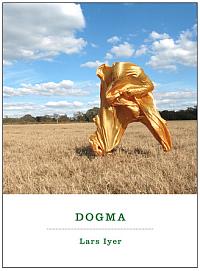|

Passages
Franceso Viscuso
_______________________
Three poems from "Fire Exit"
Robert Kelly
presented by Jerome Rothenberg
76.
the nomad always has another planet up his sleeve
bewildering autumn warblers
only the yellow ones get spotted but all of them sing
then rush to meet it in a book
where someone else’s name for this experience
is sold to you and the bird is gone
how long is a line
from silence to silence the shortest word—
that is a line
word, what is a word
across a room the deepest touch
now you’re being faintly fraudulent
romanticism is mechanical
when applied to people,
it is not a reaction to the industrial revolution
it is the industrial revolution,
privileging matter and methods of production
the divine artificer, Jacquard at his loom,
Shelley among thorns
how they make us feel,
sell your soul to the devil
doomed poet can’t even break the light
has no shadow, can’t cast a shape on matter—
because romanticism is all about production
about having some effect, about causing
perturbation in the system, nature and marriage,
about leaving a mark
because romanticism is Roman is Rome
is rule and sentimental grammar
and ego-worship, where Caesar’s god
is Caesar’s self
and god is anyone you pick to pay
your bloody bulls and barley to
or at midnight squealing pigs
to Hecate
pine cones on fire.
...(more)
Fire Exit Robert Kelly Black Widow Press
Robert Kelly reading the whole of Fire Exit on Cuttyhunk Island, 2008
Robert Kelly interviewed by Mark Thwaite
(....)
Listening, I think it’s about listening. I have come to believe (and I keep saying this, so I’m sure you’ve heard it before) that every language is a second language, language itself is a second language. We remember childhood, the vague excitement of heard words, their colors, their shapes in our ears we tried to taste in our mouths, words were things then, and the system that any natural language is hadn’t gelled yet for us. (Michel Leiris is wonderful on that epoch.) We heard, and what we heard the Others saying somehow, but we didn’t know how, somehow related to, mapped onto, connected with, the other things around us, the thing things. Things that spoke to and in us with a vividness and distinctiveness, each its own. I keep trying to listen to things that way still again, things that are ‘always already’ speaking (in that famous French phrase). So one way to answer is to say that there are three phases: things and no language (earliest childhood), things and language distinct but interlinking (ordinary life and language), the words become things of their own (writing, the poem as object in a world of object, made so not by the accuracy by which it may map some prior emotional state of the ‘poet’ – that is, not by its force of representation – but by the fact, thingliness of the language itself.)
I want to write Thinglish. And when I push students in workshops, it’s towards Thinglish, the pebbled streambed that purifies the stream of language that runs over it.
...(more)
Robert Kelly reads in Bard Hall December 2, 2012
Robert Kelly reading from Uncertainties and from new work December 8, 2012
_______________________

Francesco Viscuso
via
Hands
Accidental Mysteries
_______________________
Translation as a 2-Step: Doing Nothing
Erķn Moure
jacket2
A bit further in Blanchot and his step outside time, I arrive at sentences that sound like the translator at work. At work, yes, inside the “I” or subjectivity of a writer who has already written in another language, a translator enters “in vain” that space where writing speaks to its interlocutor: “J'essaierai en vain de me le représenter, celui que je n'étais pas et qui, sans le vouloir, commenēait d'écrire, écrivant (et alors le sachant) de telle maničre que par lą le pur produit de ne rien faire s'introduisait dans le monde et dans son monde.” (my emphasis, for the translator, to many, brings “nothing” into the world—the consequence of the common belief that the translated work is written by the original writer.
(Thus writers continue to write beyond the grave. And translators, alive, are thus always already dead to what they write. Zombie me!)
Here is Lycette Nelson in the published English : "I will try in vain to represent him to myself, he who I was not and who, without wanting to, began to write, writing (and knowing it then), in such a way that the pure product of doing nothing was introduced into the world and into his world."
Or as my mind wants to read it: “I’ll struggle to represent to myself this person who I was not and, and who, without wanting to, started writing, writing (and thus knew it then) in such a way that, through writing, the pure product of doing nothing introduced itself into the world, and into ‘my’ world.”
That interior world. Elefant.
...(more)
_______________________
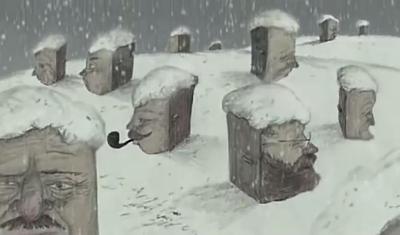
Japanese animation of Kafka’s A Country Doctor
A Country Doctor
Franz Kafka
translated by Willa and Edwin Muir
_______________________
Jean Bollack (1923-2012)
Pierre Joris
(....)
When I think of Jean Bollack — philologist, philosopher, hermeneut, translator, commentator, friend to Paul Celan & irritant to many — the first word that comes to mind is “décrasser,” a French term that means to clean, to scrub or more powerfully, to scour, even dip into a bath of acid to remove the accumulated gangue of lazy thought & language. He did this mostly to the Greek tragedies and the pre-socratic philosophers, both in translating them and in rethinking their thought — two linked activities as his focus on language, on the word itself, buttressed his approach. Charles Olson would have loved this near-monomaniacal but polyvalent insistence on the texts of Heraclitus, Parmenides and Empedokles, among others, that loudly demand that the pre-Socratics be read exactly as if they were new, i.e. not yet en-gangued by two millennia of Platonic and Aristotelean (Ari-stottle: Bollack would have loved Olson’s play) impositions of discourse as logos. ......(more)
_______________________
On Kirill Medvedev
It's No Good: Poems / Essays / Actions
Justin E. H. Smith
... what Medvedev finds most dangerous, more dangerous than skinheads, is the illusion of the non-political. He sees it as a particular achievement of the Putin regime to have convinced many Russians, as well as the famous international community, that much of what goes on in Russia results not from policy, but from human decisions that are carried out either far above politics in the cosmic realm of good and bad, or well below politics, in the sub rosa realm of the purely personal. As for the trans-political, Medvedev sharply deflates the government's attempt to mimic a sort of Bush-like response to Chechen political violence:
Take Putin's recent declaration that 'terrorism doesn't have a nationality'. A nice, liberal statement for the world press; for those in the know it communicates exactly which 'nationality' terrorism 'doesn't' have.
As for the sub-political, Medvedev is critical of what he calls (perhaps in reference to parallel, mostly unsuccessful attempts at a post-hipster ethos in the West) 'the new sincerity', which, he believes, reconciles market interests
with the resurrected figure of the author, bringing forth today's endless stream of ventriloquism (lyrical, essayistic, 'political', whatever), in which any effort at analysis, any possibility of differentiating positions and actions simply drowns.
The authorities are afraid of the new sincerity,
but they feed off and take advantage of it. Let young neo-Nazis scare the peasants with their sincere hatred, simultaneously keeping them in line. Let young poets and actors scream and curse from the stage of the Polytechnic: 'Do whatever you want', the new commisars tell them. 'You are free, independent artists. Just don't worry your pretty little heads about politics; after all, you're smart, you know yourselves that it's a dirty business. Your art will obviously outlive us all. Just leave the politics to us' . ...(more)

Hip
Poemas del rķo Wang
_______________________
“Child of an Idumean Night”
From The Gorky Variations (in progress)
Jerome Rothenberg
(....)
(2)
They celebrate a crystal solstice,
a sound behind them of a brass harmonica,
like wind inside a swollen udder,
a tumescence & a pustule.
A willow bends & snaps,
a door flies open.
A winter holocaust approaches,
the dead lie frozen,
shoes & teeth piled up,
ploughed underground by tractors.
A willow bends & snaps,
a door flies open.
Down to its final decimal,
the pustule bursts,
their voices sound like avatars,
dancers as pale as doves.
A willow bends & snaps,
a door flies open.
Their father is a jackal,
waves a parchment,
tallow dripping slowly
over a globus written large
.
A willow bends & snaps,
a door flies open.
...(more)
_______________________
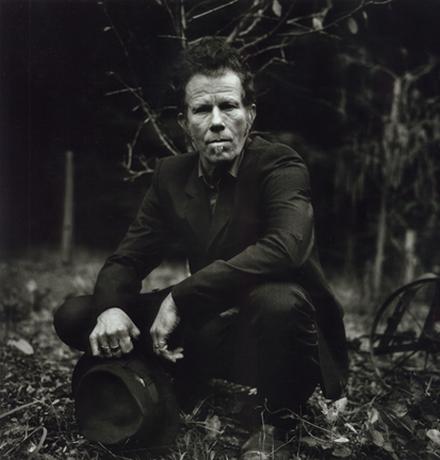
Tom Waits
b. December 7, 1949
photo - Jean-Baptiste Mondino
_______________________
Five Prose Poems
Desmond Kon Zhicheng-Mingdé
Asymptote
verb sap :: a word to the wise is sufficient
The mendicant seems less comfortable talking about just war theory, bringing in what he'd learnt from Tessa Bartholomeusz, Ralph Potter and Joseph Allen, all the thorny points of view. And how is he to somehow swirl Arthur Dyck's rights and responsibilities into the mix, like a web of moral bonds? But if Gigi is to join him, maybe even leave her lover, she will balk at venturing into the discourse of violence. Gigi is standing behind the mendicant, rolling out his straw mat for him to take a nap. The mendicant, like her lover, grows tired easily these days. Both need her help in getting up. Both are becoming forgetful. Both stop talking in mid-thought as if to return to the self, and its deep spiral. Both seem to like the immersion, as if the longer they keep silent, the greater the likelihood of their disappearing. Gigi will write about nonviolence, and invoke Gandhi, King and Ariyaratne. She has read Ninian Smart's essay, "Buddhism, Sri Lanka, and the Prospects for Peace", and she'll cite passages from it. These she will frame with something from Tambiah and Obeyesekere. This makes Gigi smile, the thought of having something to say, and having the opportunity to tell people about it.
...(more)
_______________________
Time for an Adult Conversation on Taxes
Murray Dobbin
The suggestion that we need to raise taxes in this country has become so taboo in the nation’s politics that even talking about it is seen as tantamount to political suicide. The right and its benefactors, the wealthy and large corporations, have had the field to themselves for a long time. Their framing of taxes as a “burden” and their promises of tax “relief” (borrowed from the Republicans in the U.S.) has become so imbedded in the public consciousness the spontaneous reply to the question of whether we should raise taxes is usually “no.”
Unless.
Unless you actually get to have an adult conversation about taxes with people one-on-one and reestablish the connection between taxes and a civilized society. That’s what the B.C. office of the Canadian Centre for Policy Alternatives [disclosure: I am on the board] did this summer, and the results confirm in fascinating detail what other polls have shown. When connected directly with public services and the public good clear majorities of people support increased taxes, not just on the wealthy and corporations, but even on themselves. Break through the narrow anti-tax propaganda and connect with people’s communitarian values and you find a surprising willingness to pay more....(more)
_______________________
Country Club Sopranos
American banks are on a massive crime spree.
Pete Kotz
(....)
If they'd been common robbers, the bankers surely would have faced indictments. After all, their scams have run for years, their breadth and coordination breathtaking.
But not a single boss went to jail. Some firms settled for just a fraction of what they'd stolen. Most have never admitted wrongdoing. And in the ethics-optional land known as Wall Street, many saw their stock prices rise.
America's country club set has forged its own replica of the Mafia—only bigger, broader, and capable of unleashing far more damage on the U.S. economy....(more)
_______________________

photo - mw
_______________________
Contemporary English Poetry and North American influences
edited by Sarah Dowling
jacket2
Poems by Jeff Hilson
Grus grus (common crane)
These then the isles we were blown from, to, from. From this melancholy trade & back to caulking, boring, back to old boats & the sea. Cracks is a dangerous sign see as is slacks especially dune-slacks. Cracks where the cranes lived old & wet the cranes down in the deadwood. There the front crane told a story to the back crane how he slipped on a cranesbill in a dune-slack. It was a short story. The little yellow pansy story surely? Surely they lost each other in the tall hard grass story? Surely the cranesbill grows mainly on the plains? O spica-venti! O campestris! O inarticulata!
...(more)
_______________________
The Novel and the Origins of Modern Philosophy
William Egginton
Berfrois
(....)
The distinction Descartes’ experiment engendered is basic to modern thought. It animates the entire history of epistemology, from Kant through to the phenomenological tradition prior to Heidegger; it challenges a whole counter-tradition starting with Spinoza and leading to Deleuze and contemporary affect theory; it is the core problem of the subdiscipline of academic philosophy devoted to the mind-body problem. But far more crucially, it infiltrates in a variety of guises modern science and political discourse as well: in the form of the researcher who strives to derive reliable laws from the messy influx of experimental data, necessarily minimizing human error and bias as he goes; in the idea of an abstract citizen who stands on equal footing with all other members of the same state, in patent contradiction to the blatant real inequalities that beset the people living under the aegis of that sovereign power.
In its simplest form, then, the modern world was born with the speculation that I can be wrong about everything I know while still being me; the possibility that everything about my world could be a show, put on for my benefit; that the people I engage with could be part of it; that everything could appear to be perfectly real and perfectly natural, but that it could all be false. This was emphatically not the idea behind Plato’s cave allegory; in fact, I know of no other formulation prior to Descartes of this exact idea, an idea that has proven so influential for modern thought in general. No previous philosophical formulation, that is....(more)
Berfrois

photo - mw
_______________________
Thanks (Hors Série)
presented by John Latta
And some believe this is merely a detail. And they may be right. And we may be the whole of which all that truly happens is only peelings and shreds of bark. Not that we are too much more than these. Remember they don’t have to thank you for it either.
—
John Ashbery, out of “Haibun 3” (A Wave, 1984)
...(more)
_______________________
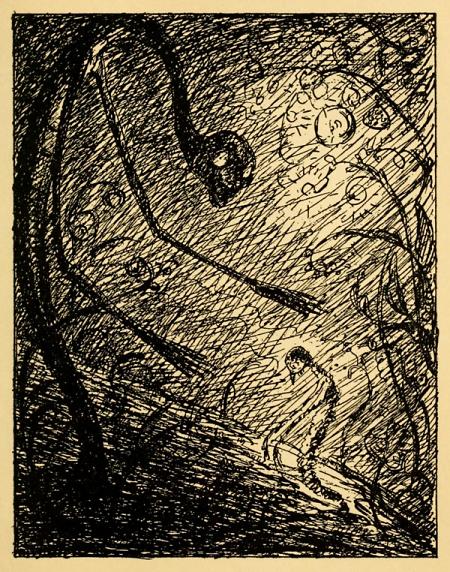
Alfred Kubin
illustrations
Lesabéndio: An Asteroid Novel (1913)
Paul Scheerbart
50watts
_______________________
"Lie close," Laura said,
Pricking up her golden head:
"We must not look at goblin men,
We must not buy their fruits:
Who knows upon what soil they fed
Their hungry thirsty roots?"
"Come buy," call the goblins
Hobbling down the glen.
Goblin Market
Christina Rossetti
b. Dec 5, 1830
_______________________
Confessions Of An Agoraphobic Victim
Dylan Trigg
white review
(....)
My episodes are endless. From the aisles of Ikea to the mountains of Montana, my psycho-geographical history is marked by phobia. Each event plots a gradual distancing from the world of unfamiliarity and a slow immersion in the supernatural. How did Vincent and I get this way, inhabiting a vampiric realm, which must seem an odd affectation to anyone who has not been touched by agoraphobia? In fact, far from a radical departure from the world of ‘normality’, agoraphobia seems to me an amplification of facets of life that are already implicit in experience more generally. One of these facets is the bodily basis of being a self.
...(more)
_______________________

The Tent
circa 1920-3
David Bomberg
b. December 5, 1890
_______________________
Music For Losers [pdf]
Enrique Vila-Matas responds to Lars Iyer's Manifesto.
unofficial translation by Sarah De Sanctis
(....)
This class of obsessive songs of abnegation is the last path, and perhaps a very modest one, that literature is left with after its death. Songs of losers, for losers. And in them rests our last chance to survive – like a deep humming out of time.
I hear you, reader, and I will not deny that the party is almost over and that the radically black sky is indifferent to all. But imagine for one moment that you are making this last journey that befalls literature and you are with the characters of your own song at the very last frontier, lost in the desert of Sonora, for instance, at the end of all quests, or in the gothic library of the great Gatsby and you’re called Owl Eyes and you are that type of guy with large lenses that gets shocked after checking that the books in Gatsby’s house are not fake. Let’s also say that there is a full moon and banjos in the garden.
‘Don’t they see?’ you say, ‘I have checked. Books are real.’
Desperate statements like this, even though charged with the exaltation of survival, compose the crazed music of the losers; sentences that are like soave silent storms, designed for an unstable time, though not as unsteady as they want us to believe. .....................................................
Nude In Your Hot Tub, Facing The Abyss
(A Literary Manifesto After The End Of Literature And Manifestos)
Lars Iyer
(....)
Vila-Matas’ narrator (Montano's Malady) has even fewer options available to him than Kafka. The structures of religion had collapsed for Kafka, leaving him in the realm of allegory, but for Vila-Matas, even the structures of allegory have collapsed, even the structure of narrative itself have fallen into ruin. Even Kafka could tell a story, but this is beyond Vila-Mata’s narrator. Whereas Kafka was born too late for religion, we are all born too late for Literature. As the narrator of Montano replays the lives and works of literary legends, he shows only how remote these figures have become for us, these writers who Literature itself already seemed to keep at a distance. Literature is moving away from us just as it was moving away from our literary predecessors—from diarists like Gide, who, as described in Montano’s Malady, is forever dreaming of writing a Masterpiece. For the idea of a Masterpiece—or even dreaming of writing a Masterpiece—is itself part of literary kitsch. This is what the narrator means when he claims that literature itself suffers from Montano’s malady: Montano’s sickness—seeing the world in terms of Literature—is also Literature’s, a mirror that can no longer reflect the world. (....) ...(more) _______________________
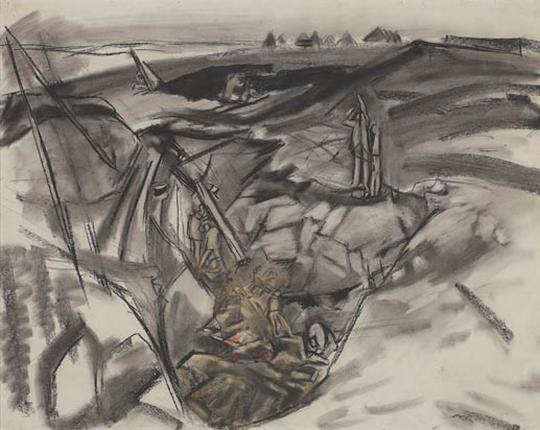
Quarrying
David Bomberg
_______________________
Draft 112: Verg
Rachel Blau DuPlessis
alligatorzine
(....)
Sizes, wires, assizes in the site, other boundaries on this border. Maps and lines are drawn over bodies. Where did “history” put this place? Why did it not “stay there”? What about “them”? Should they live here, or are they basically foreign? What are the facts about myself? What is my where? It’s true that once there was an ending. It seemed as if this were what I had wanted. Why did it then open? I hardly can remember, but then it’s suddenly vivid, though even my own stories have veered over time. Another time pulses through the stifled civic membrane.
(....)
“When the axe came into the forest, the trees thought, ‘It’s fine; that handle is one of us.’” What led to what? The incomparable, the scale off, the trans-located, exiled, awkward and alarmed, the clatter, the shattering, have all been part of our lives for so many years. This is what we have. Then you get tired. Then resigned. Then it becomes half noticed. Or less. ...
...(more)

photo - mw
_______________________
'Laundry List' and Other Poems
John Ashbery
PN Review 208
Palmy
Not beaten to a pulp, not even tapped
on the shoulder in the crowd at noon
by a well-meaning but careless friend,
then left to sink under your own regard.
So what if children don't dance, and burghers
recall their dignitas? It was your scruples
brought us here. I first read you that.
The time to go home has been now.
He will have thickened, your vast friend,
always sentient for what their agents
might deploy, then barren, less hybrid, sustained
by a mood. Shadows replace what looked
dappled then, when there were fewer takers,
more points of origin, less evaluation. More brass,
less hubris. It all balances out in the opposite
current that keeps us alive, the baleful
and the artless. Fathers, sons, accountants, cars
asked us to keep their place. We grew innocent.
...(more)
_______________________

photo - mw
_______________________
A Walking Tour of Light
Leif Schenstead-Harris
(....)
... True thought, counterfeit thought, counterfeit true thought and truly counterfeit thought? In language these are difficult questions, and under the present light the questions become dim—the light is passing, Babel has fallen, and clamorous questions are being raised.
Perhaps the sun is not gone quite yet, however. These words I offer up as counterfeit: walk towards the light; head into the darkness. Fear no censors. Their doublespeak cannot regulate silence. But watch, with Cavafy’s carefully ironic Watchman at the turn of modernity, for the Atreids’ return:
The light is good; good are those en route;
and all they say and do is also good.
So let us pray things turn out well. And yet
Argos is capable of making do without
Atreids. Royal houses aren’t everlasting.
People, certainly, will be saying all sorts of
things.
As for us, let’s listen. But we won’t be taken in
by ‘the Indispensable,’ by ‘the One and Only,’
by ‘the Great.’
They always find another straightaway
who’s indispensable, the one and only, the
great.
The Word Hoard
Volume 1, Issue 1 (2012) Community and Dissent
_______________________

photo - mw
_______________________
Error
assembled by John Latta
But the beauty is not the madness
Tho’ my errors and wrecks lie about me.
And I am not a demigod,
I cannot make it cohere.
If love be not in the house there is nothing.
—
Ezra Pound, out of “Canto CXVI” (Drafts and Fragments: Cantos CX-CXVII, 1968)
(....)
All borders between men were closed.
Now all is different without having changed
As though one were to pass through the same street at different times
And nothing that is old can prefer the new.
An enormous merit has been placed on the head of all things
Which, bowing down, arrive near the region of their feet
So that the earth-stone has stared at them in memory at the approach of an error.
—
John Ashbery, out of “A Last World” (The Tennis Court Oath, 1957)
...(more)
_______________________

photo - mw
_______________________
In the Absence of Words
Beatriz Terrazas
Words used to come easily to me. Words to speak, words to write.
But now they do not come – or will not come – when I want them. When I reach for them, they move into the quiet corners of my mind, their architecture hugging the walls of thought so that I struggle to discern them, to peel them away from the shadows. Where is the word that fits the prickly shape of my grief, or, the word that echoes the hollow emptiness of my belly? Where the word that mimics the way anger floats on the surface of my days, a slick spill I cannot contain?
Sometimes when I turn away they come; the words and phrases materialize, as if they’ve always been there had I only chosen to look.
They murmur in my sleep: Her hair, straight as corn.
They tease me while I’m driving: Long ago Sundays I remember as yellow.
They interrupt my dinner: I am windswept streets.
But more often, they awaken me in the middle of the night, a tangled knot of garbled language in my throat. I lay there, sleep banished, thoughts racing, yearning for the notebook on my nightstand, but knowing that the second I reach for it, the knot will dissolve and the words will dissipate into the dark....(more)
On Writing Dementia Edited by Susan M. Schultz EOAGH
|


